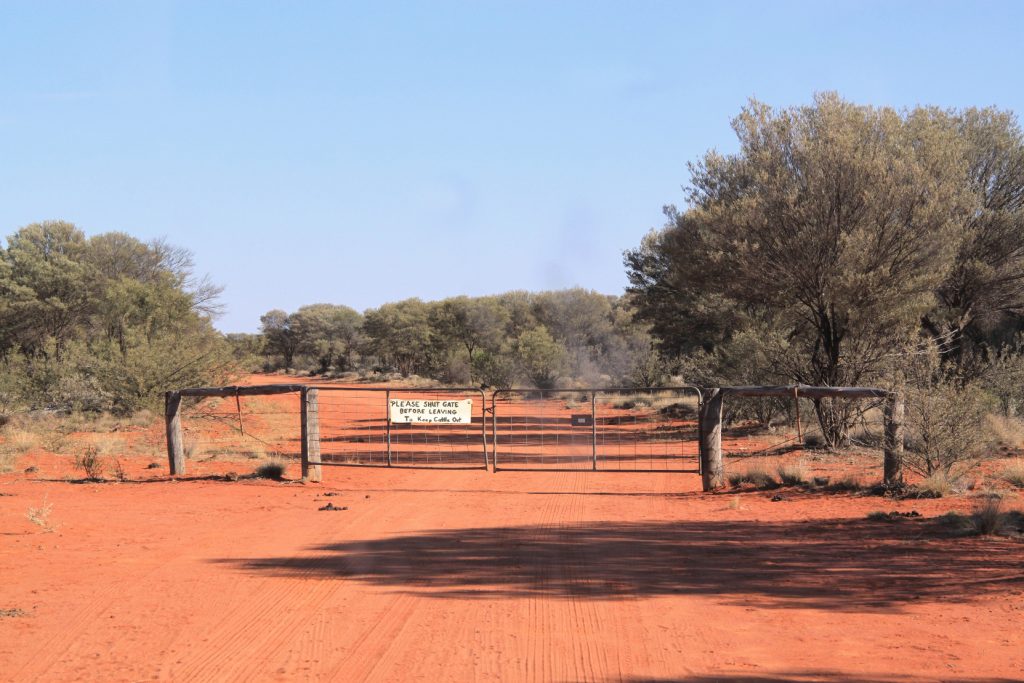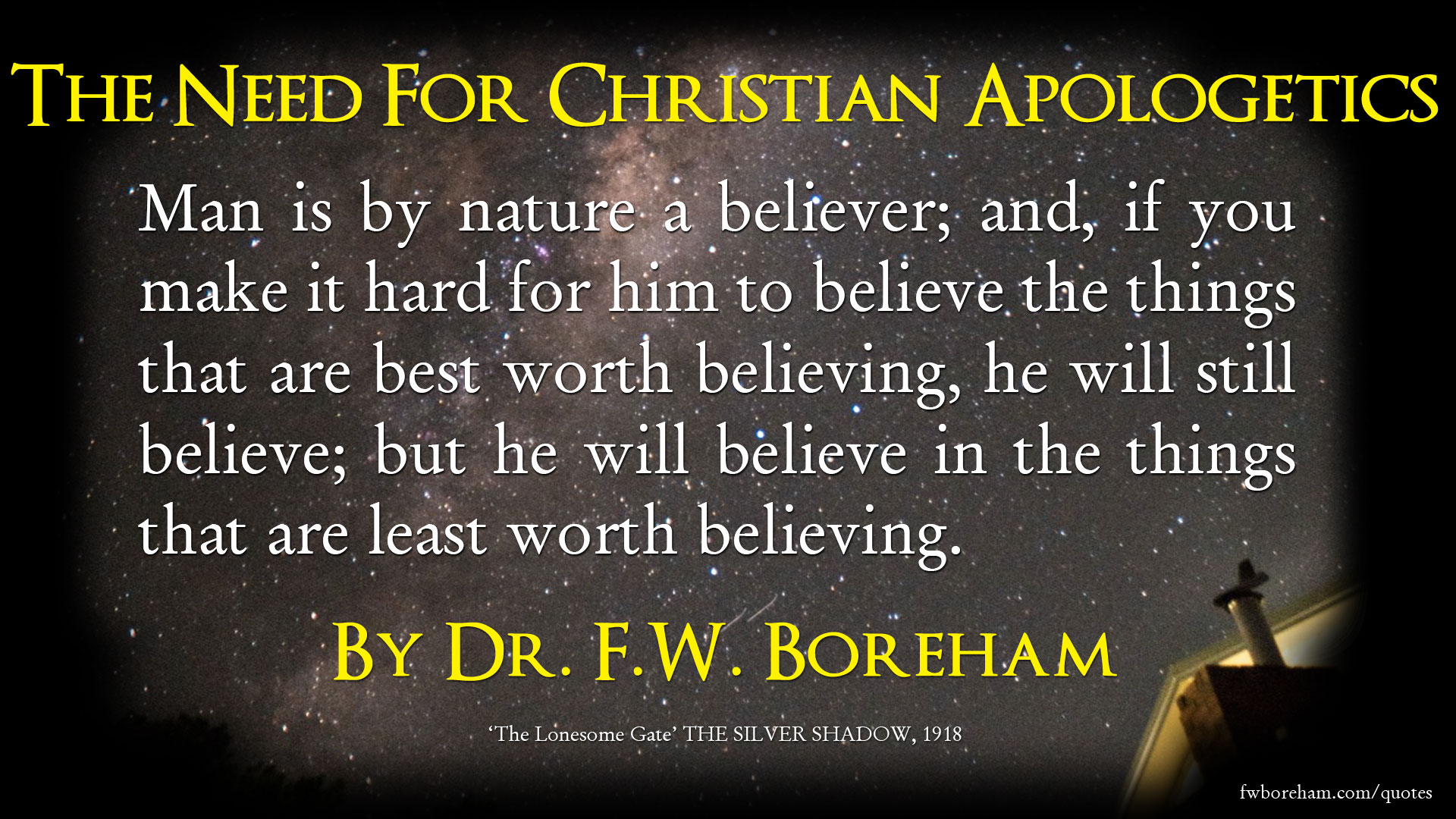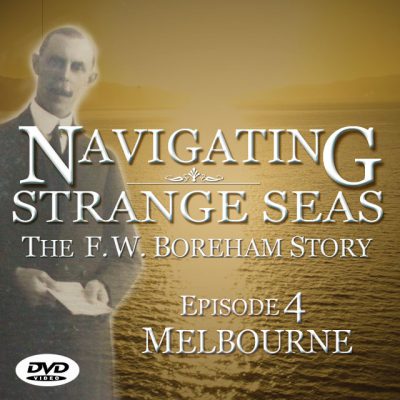
Home > FWB Books > The Silver Shadow > Lonesome Gate
IV
LONESOME GATE

Lonesome Gate, you must know, is in the Never-Never country. Right away up in the interior of Australia there were, years ago, two great sheep-runs adjoining each other: the Gallagher run and the Aberdeen run. A fence divided them, with gates across the roads. In course of time the Gallagher run came into the market, and was bought by the owner of the Aberdeen run. The necessity for fences and gates no longer existed. The fences were not removed, but were allowed to fall into disrepair. The consequence is that as you drive along the road from Wilbur’s Creek to Tireni you come upon a great gate that stands there all by itself. You can scarcely see a trace of the fence in either direction. But there is the gate! And from the top bar the huge letters still shout as loudly as ever: Please shut this gate! One of these days it may occur to somebody to remove the obstruction; but meanwhile Lonesome Gate blocks the highway.
Now that the fences attached to it are gone, Lonesome Gate is a nuisance. No farmer jumps down from his gig to open it without wishing it at the bottom of the deep blue sea. Yet Lonesome Gate is not the only nuisance of its kind. Nobody can have knocked about the world very much without having come upon scores of such gates, standing all alone, with never a fence near them. And yet, obsessed with an exaggerated estimate of their own importance, they pathetically appeal to be kept shut! Things have a way of living too long.
Was there ever a finer movement than that which led to the establishment of the Pharisees? Foreign influences were surging into Palestine like a flood, and there was grave danger that the great Jewish tradition might be swept away before it. Then arose the Pharisees to keep alight the torch of patriotism in the Hebrew breast. It was a magnificent movement. But conditions changed. The Caesars conquered Palestine. A new atmosphere came into existence. For Pharisaism there was no longer room. But, like Lonesome Gate, which persists in surviving the fence that once stood beside it, Pharisaism refused to die. When it ceased to be beneficent it began to be baneful. And, as a consequence, the Pharisee stands in the New Testament as a thing of derision and contempt.
No; the gate is of no use after the fence attached to it is gone. I can understand that, once in a blue moon, some bleary-eyed and dull-witted beast might come meandering down the road, find his progress arrested by the gate, and stand with his head over it until somebody should come and let him through. But that can only happen once in a blue moon. Ordinarily, all the cattle that come will see at a glance that the gate is a bogey; that there are no fences on either side of it ; and that they can make headway against the barrier by the simple expedient of walking round it. I have no reason to suppose that Lonesome Gate is maintained by Government. But, without being too hard upon my political friends, I really should not be surprised if I were to hear from some one in the neighbourhood that, although the fences have vanished, the Government carefully repairs and repaints Lonesome Gate every year. Governments have a knack of doing that kind of thing. They erect gates against the cattle that stick blindly to the road; but they put up no fences against the creatures that will avoid the gate and go bellowing round it. They will legislate against noxious weeds and swine fever and riding on the footpath ; but against the titanic evils that gnaw their way into a nation’s heart and suck its very life-blood they will raise but few obstacles. They may maintain a gate, it is true, and may insist that that gate must be kept shut ; but there is no fence, and the monstrous things rash in and trample down everything.
Then, again, at the opposite extreme, there is old John Cranston. John is a great temperance advocate. His enthusiasm, constantly at white heat, has always evoked my admiration; and his toil, always prodigious, has often shamed my own puny efforts in the same excellent cause. And yet, somehow, I thought of John Cranston as soon as I heard the story of Lonesome Gate. For I was never able to convince John Cranston that we need something beside the gate. I once invited him to church. He abruptly declined, and I fancied I detected a contemptuous curl on his lip. The churches, he said, were not practical enough for him. Religion was too other-worldly, too visionary, too nebulous. He thought that ministers should give up talking about some other world and do their best to patch up this one. I once asked him to support me in an effort I was making at that moment to minimize another glaring wrong. He rejected the proposal with disdain. What was the good, he wanted to know, of tinkering with this thing and that thing so long as the hotel bars were licensed to addle men’s brains, degrade their characters, and ruin their homes? I assisted him by every means in my power in his heroic attempt to shut the drink evil out of the world. But he would never help me to bring the kingdom of God into it. He could never see that even a total abstainer might still be a fiend if, for example, he yielded to utter selfishness or was led captive of a vile temper. I had to give up reasoning with him. When I last saw him he was still working away at the gate. And I recognized that the gate was very necessary. But I often wished that his eyes could have been opened to see that the gate would be quite useless unless it were supported by stout fences on either side.
The real trouble lies in a lack of imagination. If those political and private individuals who are so enamoured of the gate that they never think about a fence would project their fancies into the mental processes of a flock of sheep, they would see at once the frailty of their reasoning. When Frank Buckland was revolutionizing the fisheries of England, he used to stand up to his waist in the English rivers and say to himself, ‘Well, now, if I were a salmon, what would I do?’ It would be a fine thing if these gate-worshippers would adopt similar tactics. Let them set out along the road from Tireni to Wilbur’s Creek until they come to Lonesome Gate. Then let them stand in front of it for precisely sixty seconds, saying to themselves, ‘Well, now, if I were some old bellwether, leading a flock of sheep along this high-road, what would I do?’ And at the expiration of the sixty seconds you will hear their peals of laughter though you be a mile away. What self-respecting bellwether is going to be baulked by a gate, if the gate be unsupported by a fence or hedge ? He will not even attempt to get through it or over it. He will go round it with all the flock thundering at his heels. If the road is blocked by a gate, why, the sheep will leave the road and take to the grass, that is all.
They will leave the road and take to the grass! That is the weakness of atheism, scepticism, agnosticism, and of all the denials and negations that ever were. The human mind moves naturally along the road of faith as the sheep move naturally along the road from Wilbur’s Creek. Then its progress is abruptly challenged by some intellectual obstruction, as the progress of the sheep is challenged by Lonesome Gate. The highway of faith is blocked! A difficulty stands in the way ! What will the mind do ? It may attempt to get through or to get over for the sake of keeping to the road. But nine times out of ten the reason, baulked by the gate, takes to the grass. If it cannot pursue its course along the road of faith, it will defy the gate and forsake the highway at the same time. ‘ My lord,’ said Beaconsfield, in addressing a famous gathering at Oxford ‘my lord, man is a being born to believe ; and if no Church comes forward with its title-deeds of truth, sustained by the traditions of sacred ages, and by the convictions of countless generations, to guide him, he will find altars and idols in his own heart and in his own imagination.’ If, that is to say, the gate blocks his way, forbidding him to believe what he has been accustomed to believe, he will have his revenge by believing in spite of the gate; but he will believe something much less believable. He will not be obstructed or turned back ; he will take to the grass.
In his Old Red Sandstone, Hugh Miller makes very merry at the expense of M. Maillet. This Maillet was much too great a philosopher to credit the scriptural account of Noah’s flood; yet he could believe that the whole family of birds had existed at one time as fishes, which, on being thrown ashore by the waves, had got feathers by accident; and he could believe that men themselves are but the descendants of a tribe of sea monsters who, tiring of their proper element, crawled up the beach one sunny morning and, taking a fancy to the land, forgot to return!’ Maillet came to the gate, and his advance along the highway of faith was blocked; so he took to the grass. The faith lost him, it is true ; but the gate was cheated of its prey.
It has always been so. Show me an age in which a gate was set across the path of faith ; and I will show you an age in which, there being no fence, men set off across the grass. Man is by nature a believer; and, if you make it hard for him to believe the things that are best worth believing, he will still believe; but he will believe in the things that are least worth believing. In the days that followed the Restoration, when religion trudged barefoot and vice walked in golden slippers — the day of Hobbes and scepticism — men believed in ghosts as they had never done before. The churches were forsaken; but every lane had its spectre, and every street its haunted house ! When, in the days of the Revolution, Frenchmen abjured Christianity, did they manage without a religion? Let Carlyle answer. ‘Procureur Chaumette and Municipals and Departmentals arrive, and with them the strangest freightage — a New Religion! Demoiselle Candeille, of the opera, a woman fair to look on when well rouged; she, borne on palanquin shoulder high; with red woollen night-cap; in azure mantle ; garlanded with oak ; holding in her hand the Pike of the Jupiter-People, sails in; heralded by white young women girt in tricolour. Let the world consider it! This, O National Convention, wonder of the universe, is our New Divinity !’ What does it mean ? It means that if the Revolutionists could not block faith altogether, they had a thousand times better have let it alone. They put up a gate across the main road ; but there was no fence on either side; and the people, like a flock of sheep, turned from the road, but rushed on across the grass. They found themselves excluded from a religion that was sublime ; so they concocted for themselves a religion that was ridiculous. ‘Why, gentlemen,’ said Napoleon, a few years later, ‘it seems to me that you make up for believing nothing in the Bible by believing all the folly outside it!’
I remember once in New Zealand travelling in an express train with a gentleman who, growing confidential, opened his heart to me. He told me of his boyish experiences at church and Sunday school. He described to me his old home; his father’s influence; and his mother’s faith. He himself afterwards joined the church and taught in the Sunday school. Then he suddenly came upon the gate across the road. His Christian progress was challenged. A fellow clerk, for whom he entertained a kind of infatuation, had presented him with all the latest products of the cheap rationalistic press; and it had left his faith in fragments. I expressed my sympathy and sorrow.
‘And so. now,’ I added, ‘you believe in nothing.’ ‘Oh, well,’ he explained apologetically, ‘I have joined a spiritualistic society, and am just now returning from a seance!’
The gate had not stopped him, for there was no fence. It had simply turned him from the path. He had taken to the grass. ‘I have observed,’ wrote James Russell Lowell, ‘I have observed that many who deny the inspiration of Scripture hasten to redress the balance by giving a reverent credit to the revelations of inspired tables and camp-stools,’ That is always the trouble. The lover can bear with fortitude the rejection of his love ; but it is a bitter thing for him to see the object of his strongest and tenderest affections in the embrace of one whom he knows to be altogether unworthy of her trust. It is sad enough to see men turn from the Church, from the Saviour, from the Cross ; it is a thousand times sadder so see them, forsaking these things, become infatuated with frivolities and baubles.
‘My people’ — so runs one of the most affecting complaints of all time — ‘My people have committed two evils; they have forsaken Me, the Fountain of Living Waters, and have hewed out to themselves cisterns, broken cisterns, that can hold no water.’ The worst of the fenceless gate on the road to the Celestial City is that, having no power to arrest the progress of the pilgrims, it forces them aside into those fields in which Giant Despair pounces upon them, and hurries them to his dismal dungeons.
-FWB







